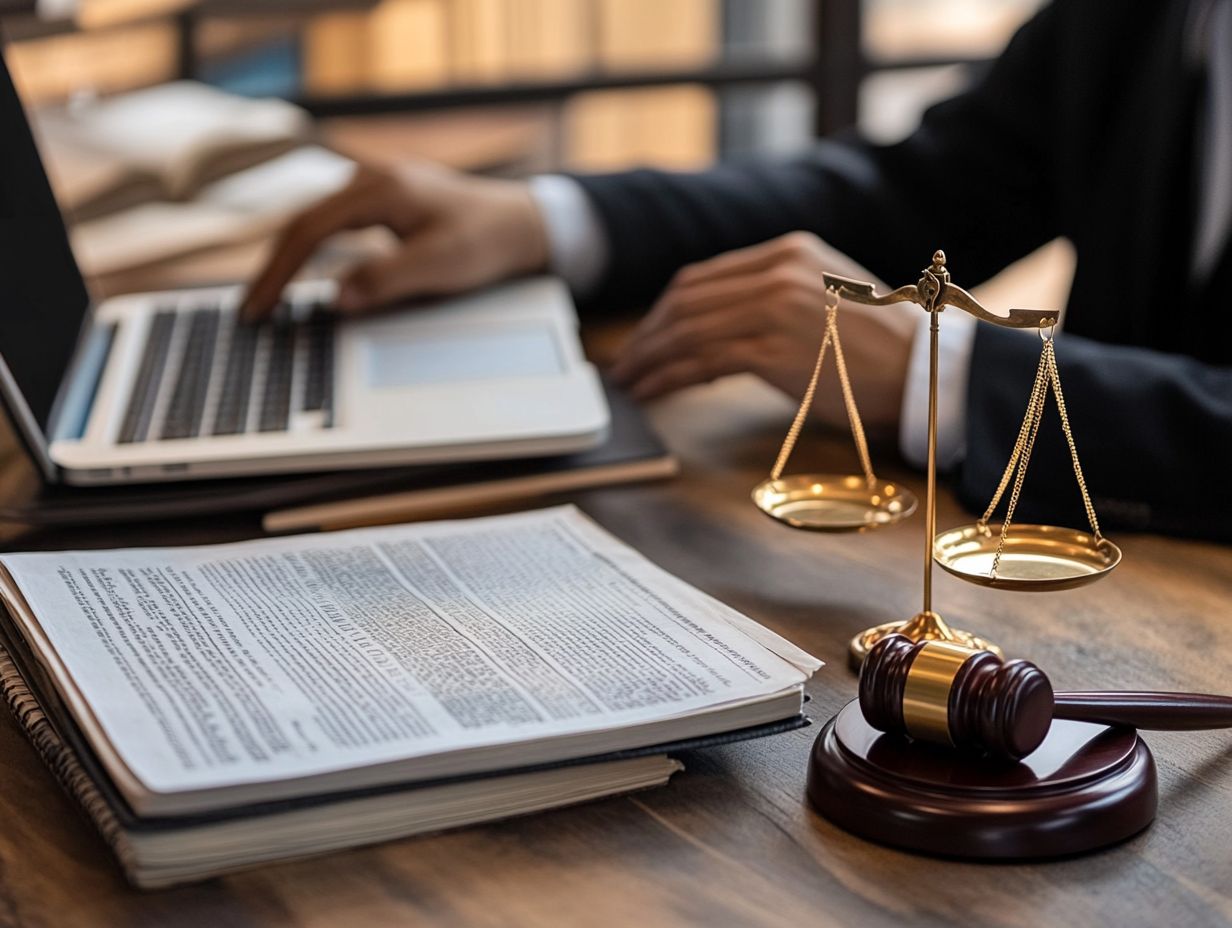How to Stay Informed During a Criminal Case?
Navigating the criminal justice system can feel like an uphill battle, whether you re directly involved or supporting someone who is. Understanding the legal process is essential, and staying informed is your best ally in ensuring fairness and justice.
This guide will walk you through various ways to keep yourself updated during a criminal case, from attending court proceedings to accessing public records and maintaining open lines of communication with legal representatives.
We ll also delve into the emotional toll these situations can take on you and provide valuable tips for self-care and support. Join us as we unravel these critical insights, paving a clearer path through the intricacies of the criminal justice system.
Contents
- Key Takeaways:
- Understanding the Criminal Justice System
- Ways to Stay Informed During a Criminal Case
- Importance of Staying Informed
- Tips for Managing Emotions During a Criminal Case
- Frequently Asked Questions
- What should I do if I am a witness or victim in a criminal case?
- How can I find information about a specific criminal case?
- What is the role of the media in keeping the public informed about criminal cases?
- Can I attend court hearings to stay informed about a criminal case?
- What are my rights as a victim in a criminal case?
- How can I receive updates about a criminal case if I am unable to physically attend court hearings?
Key Takeaways:

1. Attend court proceedings to stay informed during a criminal case.
2. Access public records to gather information about the legal process.
3. Communicate with your legal representatives for updates and clarification.
Understanding the Criminal Justice System
Understanding the Criminal Justice System is essential for you as a victim or witness. It helps you navigate the maze of federal laws and courtroom procedures in the United States.
This system involves various processes, including the trial process, the responsibilities of prosecutors, and the roles of legal representatives like assistant United States attorneys.
Victim services protect your legal rights and ensure that your voice resonates throughout court proceedings and case resolutions, ultimately enhancing community safety.
Overview of the Legal Process
The legal process in the federal court system kicks off with the filing of a criminal complaint, setting the stage for the court appearances and the trial that will follow.
After this initial step, the accused formally appears before the court to hear the charges against them and enter a plea. This moment is pivotal; defendants can opt for a guilty plea, which might lead to plea deals that may help resolve the case more quickly but could also restrict victims’ rights and their involvement in the proceedings.
Before the trial, various pretrial motions may be filed, tackling issues like evidence admissibility and plea negotiations. These motions play a critical role in shaping the case s trajectory and influencing the choices made by everyone involved.
When the case finally goes to trial, the rights of both the defendant and the victim take center stage, emphasizing the delicate balance that the legal system strives to maintain.
Ways to Stay Informed During a Criminal Case
Remaining informed throughout a criminal case is crucial for you as a victim or witness. It gives you the power to comprehend your legal rights and skillfully navigate the intricate landscape of court proceedings.
Attending Court Proceedings
Attending court proceedings can feel overwhelming, yet it s a vital step for victims and witnesses, allowing you to witness the trial process up close and grasp the intricacies of courtroom dynamics.
The emotional weight of such an environment is considerable, making it essential for you to be well-prepared for what lies ahead.
You might find solace in the victim-witness program, which offers invaluable support and guidance throughout this journey. This program not only helps you navigate the legal proceedings but also eases some of the emotional burdens that come with testifying.
Rest assured, you have legal rights that protect your safety and dignity within the courtroom. These rights ensure that you are treated with respect and that necessary accommodations are made to help you manage any trauma you may encounter during this process.
Accessing Public Records

Accessing public records is essential for you as a victim or witness. It helps you stay updated on the developments in a criminal case. These documents shine a light on the legal process, ensuring transparency every step of the way.
You can take proactive measures to obtain various records, such as police reports, court filings, and even sentencing documents. These resources are typically accessible through local government websites or at the courthouse. This makes it easy for you to find what you need.
By understanding the information within these records, you can better safeguard your legal rights. It also supports your case and builds your confidence in dealing with the legal system. Many assistance services offer guidance on interpreting these records, empowering you and providing crucial support during challenging times.
Communicating with Legal Representatives
Effective communication with your legal representatives, including victim advocates and assistant United States attorneys, is vital for ensuring that your rights are upheld during the trial process.
This connection empowers you to feel heard. It also enables you to articulate your concerns regarding testimony requirements, evidence collection, and any emotional distress you may be experiencing due to the incident.
When you share your fears or uncertainties about the trial, you’re helping your legal counsel craft a stronger case. This can significantly influence the outcome.
Your cooperation is vital in shaping how the case unfolds. Your willingness to engage in open dialogue ensures that everyone is on the same page. This leads to a more cohesive strategy that protects your interests throughout this legal journey.
Importance of Staying Informed
Staying informed can be your greatest ally in the legal process! Staying informed throughout the criminal justice process is crucial for fairness and justice for victims and witnesses.
When you are well-informed, you empower yourself to advocate more effectively for your rights and needs. This helps you navigate the complexities of the system with confidence and clarity.
Ensuring Fairness and Justice
Ensuring fairness and justice in a criminal case hinges on your active engagement as a victim or witness. Your presence can significantly shape the dynamics of the courtroom.
Your involvement gives you power. It also helps prosecutors build a stronger case by providing crucial evidence and testimony.
By understanding your legal rights, you can navigate the complexities of the judicial process with greater confidence. This knowledge enables you to advocate effectively for yourself. It ensures that your experiences are acknowledged and your voice resonates in the courtroom.
In turn, this revitalizes the entire system, making it more responsive and equitable. When you take an active role, you contribute to a more comprehensive pursuit of justice that transcends mere legal outcomes.
Being Prepared for Potential Outcomes
Being prepared for potential outcomes in a criminal case is essential for you as a victim or witness. It can help mitigate emotional harm and make your journey through the legal process much smoother.
Understanding the various scenarios like plea agreements and sentencing hearings allows you to brace yourself for what lies ahead. In many cases, plea agreements can result in shorter or alternative sentencing. So it’s crucial for you to know your rights, especially when it comes to restitution.
Don t wait until the last minute to understand your options! By familiarizing yourself with the legal landscape and actively engaging with law enforcement and legal representatives, you empower yourself in the pursuit of justice.
Preparing emotionally and gathering any necessary documentation before hearings or negotiations can further strengthen your position. This enables you to effectively advocate for your restitution rights and the overall resolution of your case.
Tips for Managing Emotions During a Criminal Case

Managing your emotions during a criminal case is essential, especially as a victim or witness. The process can bring about considerable emotional turmoil and stress. It’s vital to employ effective coping strategies to navigate these challenges successfully.
Seeking Support
Seeking support is an essential step for those like you who are navigating the emotional turmoil that often accompanies involvement in a criminal case. Recognizing that you are not alone on this journey can significantly ease feelings of isolation and distress.
Community resources, such as counseling services and support groups, are invaluable. They provide a safe space where you can share your experiences and feelings without judgment.
Victim-witness programs are there to guide and assist you throughout the legal process. They ensure you understand your rights and have access to the resources you need.
Through these support services, the emotional scars from your experience can be addressed, fostering resilience and aiding in your healing journey.
Practicing Self-Care
Practicing self-care is essential for you as a victim or witness, helping to maintain your emotional well-being throughout the often-stressful criminal justice process.
Engage in self-care techniques like mindfulness meditation, journaling, and regular physical activity to significantly alleviate lingering feelings of anxiety and stress.
Seek community support through local victim services to connect with a network of understanding peers and professionals. This provides both practical resources and emotional assistance.
Incorporating techniques such as deep breathing exercises and establishing a daily routine can further enhance your mental resilience.
By prioritizing self-care, you can foster a sense of control and give the power to manage as you navigate the complexities of the criminal justice system. This way, you can turn challenges into opportunities for personal growth.
Final Thoughts and Recommendations
Navigating the complexities of a criminal case can feel challenging, but it’s essential for you as a victim or witness to be informed, engaged, and supported to ensure your rights and needs are met.
Understanding the resources available to you is vital. You re encouraged to reach out to local victim services, which offer crucial support and guidance throughout the legal process.
Connecting with community support groups can foster resilience, allowing you to share your experiences and find emotional recovery. Remember, you are not alone; help is always within reach.
Taking proactive steps, like attending counseling or participating in peer support, can significantly aid in your healing journey and help you reclaim a sense of control in your life.
Frequently Asked Questions
What should I do if I am a witness or victim in a criminal case?

If you are a witness or victim in a criminal case, it is important to stay informed about the details and progress of the case. You can do this by regularly checking the court’s website for updates, attending court hearings, and staying in contact with the prosecutor handling the case.
How can I find information about a specific criminal case?
You can find information about a specific criminal case by searching the online database of the court where the case is being heard. This database will have the case number, charges, court dates, and other important information related to the case. You can also contact the court clerk for more information.
What is the role of the media in keeping the public informed about criminal cases?
The media plays a crucial role in keeping the public informed about criminal cases. They attend court hearings and report on the progress of the case, providing updates and insights to the general public. It is important to fact-check information from the media and only rely on reputable sources.
Can I attend court hearings to stay informed about a criminal case?
Yes, you can attend court hearings to stay informed about a criminal case, as long as they are open to the public. Court hearings are usually listed on the court’s website, and you can also contact the court clerk for information on attending hearings. Keep in mind that some hearings may be closed to the public for sensitive matters.
What are my rights as a victim in a criminal case?
As a victim in a criminal case, you have the right to be informed about the progress of the case, the right to attend court hearings, and the right to provide a victim impact statement. A victim impact statement allows you to share how the crime has affected you. You also have the right to be notified of any plea deals or sentencing hearings. It is important to familiarize yourself with your rights as a victim.
How can I receive updates about a criminal case if I am unable to physically attend court hearings?
If you can t attend court hearings in person, you can sign up for email or text notifications through the court’s website.
You may also contact the prosecutor managing the case to request updates via email or mail.
Don t miss out! Check the court’s online database for the latest updates on your case.






